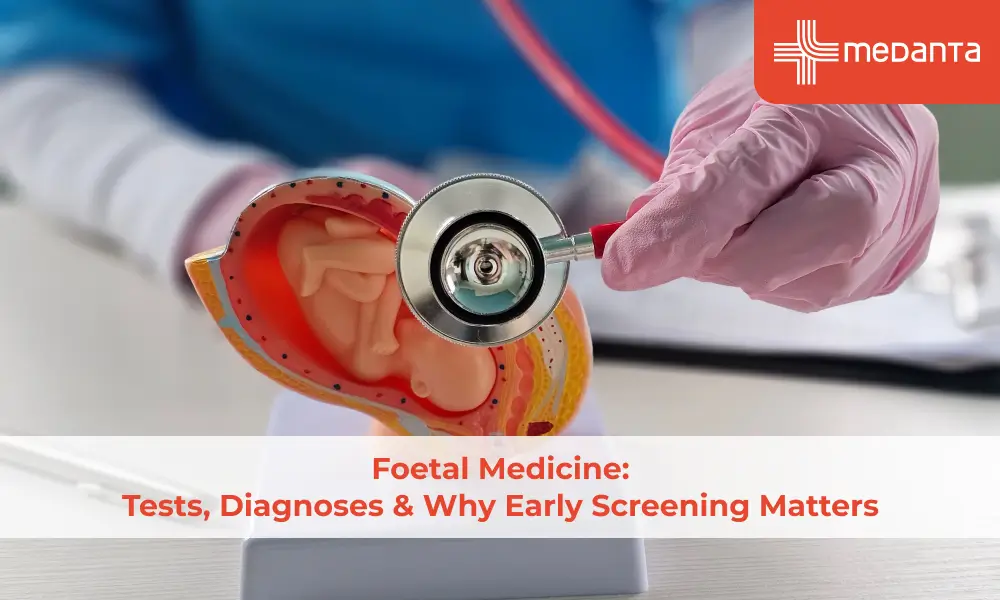Foetal Medicine: Tests, Diagnoses & Why Early Screening Matters

TABLE OF CONTENTS
Prenatal testing can detect up to 90% of major chromosomal abnormalities and plays a vital part in pregnancy care. Parents can learn about their baby's health through these tests as they begin their parenting experience. This knowledge helps them prepare for the future.
If you go for screening tests, they can show the likelihood of your child getting genetic conditions like Down syndrome and trisomy 13. These diagnostic tests can give you conclusive results about specific foetal conditions.
Your journey to a smooth and healthy pregnancy has a lot to depend on prenatal screening. Your doctor will use these assessments to spot any probable issues that may affect you later on. As a parent if you understand the various types of prenatal testing, you can make better choices about your pregnancy care.
What Is Foetal Medicine?
As a foetal medicine specialist (also called maternal-foetal medicine (MFM) or perinatology specialist), your doctor helps you with problems that could affect you or your baby or both during pregnancy. These specialists carry out extensive investigations on you using advanced techniques like ultrasound and genetic testing to diagnose conditions and ensure the delivery of a healthy baby.
Several situations make foetal medicine a vital part of care:
Pre-existing conditions like high blood pressure, diabetes, or obesity
Previous pregnancy complications
Multiple births (twins or triplets)
Abnormal test results that show potential foetal issues
Doctors refer mothers to MFM specialists after routine screenings show possible problems or if mothers have known risk factors.
Prenatal Screenings vs Diagnostic Tests
Screening tests help you identify whether your baby has chromosomal abnormalities, but they can't provide definitive answers. Blood tests and ultrasounds serve as common examples.
If you go for diagnostic tests like amniocentesis and chorionic villus sampling (CVS), you can identify whether your baby has specific conditions like Down Syndrome with over 99% accuracy.
Genetic testing can help you identify potential issues in your child even if they are not born. Your doctor can recommend a series of tests ranging from carrier screening for recessive diseases to analysis of foetal DNA in maternal blood. On top of that, first-trimester combined tests can detect Down syndrome and other chromosomal conditions.

Role of Foetal Medicine in High-risk Pregnancies
MFM specialists work together with other doctors to create customised care plans for high-risk pregnancies. Regular monitoring and specialised interventions help them manage conditions that might affect the mother's or baby's health. MFM specialists continue to play a significant role in improving outcomes, as maternal mortality rates have dropped by a lot over the last several years.
Treatment Options for Diagnosed Conditions
If you are looking for treatment options for conditions diagnosed before the birth of your baby, medical science has numerous alternatives.
Your doctor can now give foetal blood transfusions directly through your abdomen into your baby's umbilical cord to treat severe anaemia.
The results of fetoscopic laser procedures to treat twin-to-twin transfusion syndrome are fantastic. Your doctor can use a tiny camera to eliminate abnormal blood vessel connections in the placenta. All these new innovations have led to better outcomes than previous methods.
Available treatments include:
Minimally invasive procedures: You have options such as shunt placements and fetoscopic surgery
For addressing spina bifida and lung masses you have the options like open foetal surgery
Your doctor may give transplacental therapy with medications crossing the placenta
There are shunting procedures for bladder obstructions
Babies with platelet-related conditions respond well to specialised therapies.
Specialised centres with neonatal surgical facilities should handle most births involving detected anomalies, rather than requiring early delivery. This integrated care approach will give babies the best support from initial diagnosis through delivery and recovery.
When Should You Visit a Foetal Medicine Specialist?
Parents often ask about the right time to see a foetal medicine specialist during pregnancy. Your regular doctor might refer you to these experts, and with good reason, too.
You might need foetal medicine care, especially when routine scans reveal potential issues. Your doctor could recommend a specialist:
If you are suffering from health conditions such as heart disease, high blood pressure, diabetes or obesity
If you get multiple pregnancies (twins, triplets, or more)
If you come up with a history of complications linked to your previous pregnancies like preterm births or recurrent miscarriages or previous baby with genetic disorder.
If your screening test results suggest a chance of genetic conditions
A visit to a specialist before conception can help prepare for a healthy pregnancy, particularly if you have chronic health conditions.
FAQs
What does a foetal medicine specialist do?
These specialists take care of high-risk pregnancies and handle complications. They give a detailed assessment of the baby's health, run diagnostic tests, and guide parents through the journey. Their main goal involves watching existing health issues, dealing with any baby abnormalities and working with other healthcare teams.
What conditions can foetal medicine detect early?
Doctors can spot these conditions early:
Is foetal medicine only for high-risk pregnancies?
No. We focused mainly on high-risk cases, but these specialists help with regular prenatal care too. Women with normal pregnancies can benefit from advanced screening methods. Furthermore, some patients consult specialists before getting pregnant to plan ahead.
When should I ask for a foetal medicine expert?
You should reach out if you:
Are diabetic with high blood pressure, or autoimmune disease
Have bleeding or other pregnancy complications
Are carrying multiple babies
Had past pregnancy issues or miscarriages
Have abnormal findings in routine screening tests
What are the risks of foetal diagnostic procedures?
Some diagnostic tests come with risks. About 1 in 500 to 1,000 cases of amniocentesis result in miscarriage. Chorionic villus sampling has similar risks. Blood sampling from the umbilical cord is riskier in 1 in 100 procedures. Regular ultrasounds and blood tests are safe for the baby.
How accurate are foetal screenings?
Each test has its own accuracy rate. Cell-free DNA testing catches chromosomal issues 90% of the time. Blood screening with nuchal translucency works just as well for Down syndrome. Sometimes these tests suggest problems that aren't really there, so you might need more testing to be sure.
Can foetal abnormalities be treated in the womb?
Yes, doctors can treat some conditions before birth. Options include blood transfusions for severe anaemia, shunts for urinary blockages, and laser therapy for twin-twin transfusion syndrome. Babies with spina bifida can have surgery too.






